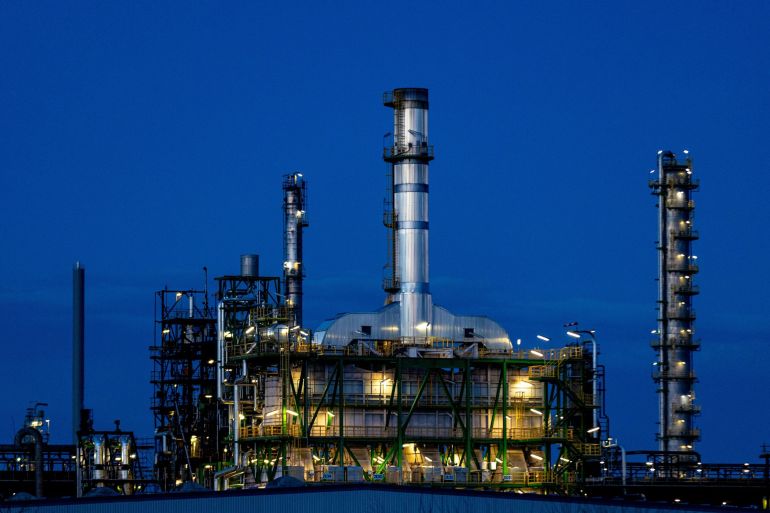EU chief proposes Russian oil ban in new round of sanctions
The proposal, if accepted by EU members, seeks to stop crude oil imports in six months and refined products by end of 2022.

The European Union’s executive has called on the 27-nation bloc to ban oil imports from Russia, among other measures, in a sixth package of sanctions targeting Moscow for its war in Ukraine.
European Commission President Ursula von der Leyen also proposed on Wednesday that three major Russian banks be disconnected from the SWIFT international banking payment system and called for a ban on three state-owned broadcasters.
Keep reading
list of 4 itemsEU sanctions founder of Russian mercenary force
France seizes Russian oligarch’s yacht amid EU sanctions
Ukraine: EU sanctions Russia defence minister, military chief
Reflecting widespread anger in the West at Russian President Vladimir Putin’s campaign launched on February 24 – which Moscow says is a “special military operation” to defeat dangerous nationalists – von der Leyen said Moscow must face consequences.
“Putin must pay a price, a high price, for his brutal aggression,” she told the European Parliament in Strasbourg.
She called on the EU’s member nations to phase out imports of crude oil within six months and refined products by the end of the year.
“We will make sure that we phase out Russian oil in an orderly fashion, in a way that allows us and our partners to secure alternative supply routes and minimises the impact on global markets,” von der Leyen said.
Alex Schindler, the president of Energy Intelligence, said that the planned ban on Russian crude oil was much easier to impose than some other oil products, such as gasoline.
He added that the crude oil imports from Russia into the EU decreased 40 percent in April compared to 2021 whereas the import of oil products has increased.
“That is the reason why the European Union is saying that it is going to phase out the products by the end of the year, while crude oil will be much quicker,” he told Al Jazeera from London.
The proposals need to be unanimously approved to take effect and are likely to be the subject of fierce debate.
Von der Leyen conceded that getting all 27 member countries – some of them landlocked and highly dependent on Russia for energy supplies – to agree on oil sanctions “will not be easy”.
If approved, the ban on oil imports will be the second package of EU sanctions targeting Russia’s lucrative energy industry.
In addition to sanctions on various entities and individuals, including Putin himself and members of his family, the bloc also previously approved an embargo on coal imports.
The EU has started discussions on a possible natural gas embargo, but consensus on targeting the fuel used to generate electricity and heat homes is more difficult to secure.
Hungary and Slovakia have already said they would not take part in any oil sanctions, but von der Leyen did not elaborate on whether they would receive an exemption from the sanctions.
Al Jazeera’s Dominic Kane, reporting from Berlin, said the EU’s proposed sixth round of sanctions on Russia “notably makes no reference to Russian gas”.
“Why? Because in a sense it’s a bit like it is the elephant in the European living room – it is too big to be ignored but also so big that to do away with it straight away might have a catastrophic effect on economies across this continent,” Kane said.
Sanctions on individuals
Von der Leyen also said the EU should target high-ranking military officers and others “who committed war crimes in Bucha”, a suburb of the capital Kyiv. Ukrainian officials allege that retreating Russian troops carried out mass killings of civilians in Bucha, which has been denied by Moscow.
“This sends another important signal to all perpetrators of the Kremlin’s war: We know who you are. We will hold you accountable. You’re not getting away with this,” von der Leyen said.
The EC has also proposed sanctioning the head of the Russian Orthodox Church, Patriarch Kirill, who has backed Russia’s war, according to a document seen by the AFP news agency.
The new list includes 58 sanctioned individuals, the agency said on Monday, adding that in addition to many Russian military personnel, it also targets the wife, daughter and son of Kremlin spokesman Dmitry Peskov.
Banks are also in the EU executive arm’s sights. Von der Leyen said Sberbank, Russia’s largest bank, should be excluded from SWIFT. She said Sberbank accounts for about 37 percent of the Russian banking sector.
“And we will also de-SWIFT two other major banks in Russia. By that, we hit banks that are systemically critical to the Russian financial system and Putin’s ability to wage destruction,” she said.
Al Jazeera’s Kane said this move was significant.
“That matters a great deal because without access to it, it will make it much harder for Sberbank and the other financial institutions being sanctioned to have dealings across the international community,” he said.
Von der Leyen also said that those alleged to be spreading disinformation about the war in Ukraine would be targeted.
“We are banning three big Russian state-owned broadcasters from our airwaves. They will not be allowed to distribute their content any more in the EU, in whatever shape or form be it on cable, via satellite, on the internet or via smartphone apps.”
She did not name the broadcasters directly, but branded the television channels “as mouthpieces that amplify Putin’s lies and propaganda aggressively. We should not give them a stage any more to spread these lies”.